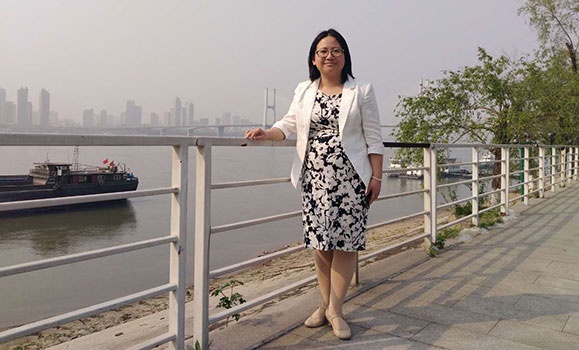News
» Go to news mainGet to know International Postdoctoral Research Fellow Desai Shan

In June of 2018, Desai Shan began a two-year term as an Ocean Frontier Institute International Postdoctoral Research Fellow at the Schulich School of Law. While here, she is conducting research on occupational health and safety regulation and management on the Great Lakes and St. Lawrence River.
“Desai’s research on how well occupational health and safety regulations of seafarers in Canada compares with international standards is groundbreaking,” says Professor Aldo Chircop. “She has been able to demonstrate that in Canada, we could do better at providing the full protection that seafarers ought to be receiving.”
We asked Shan how a lawyer from China ended up studying Canadian maritime law and ocean governance, why she chose Schulich Law, and what her future plans are.
From where does your interest in health and safety at sea come?
In 2010, when I was a trainee maritime lawyer in China, I handled a marine casualty occurring in the South China Sea. One sailor died, and 12 were missing at sea. Observing the claim process, I found that current maritime law, both at the international and domestic level, could not provide effective and efficient remedies for seafarers. After that, I started my research career in maritime occupational health and safety at the Seafarers International Research Centre at Cardiff University.
Why did you decide to research the Great Lakes and St. Lawrence River?
The shipping industry is truly global. When I was at Cardiff, we paid more attention to seafarers who are from developing countries, including China, India, and the Philippines. However, less attention was paid to developed countries. What are the working conditions of seafarers from developed countries? Could we explore good maritime governance lessons from Canada as a developed country, to address the challenges faced by global seafarers? In a research symposium at Cardiff, I shared these thoughts with two professors from Canada. They encouraged me to do some research to explore Canadian maritime occupational health and safety regulation and management.
Why did you want to come to the Schulich School of Law?
The Schulich School of Law has an international reputation in maritime law. Before coming here, I learned many of the big names of the professors from the Marine & Environmental Law Institute. With the support of Professor Aldo Chircop, and funding by the Ocean Frontier Institute, I was able to start a new research project exploring maritime occupational health and safety challenges in the Arctic.
With whom have you collaborated while you’ve been here?
In addition to Aldo, I work with Professor Barb Neis from Memorial University of Newfoundland, Professor Katherine Lippel from the University of Ottawa, and Professor Nele Matz-Lück from the University of Kiel in Germany.
How have you benefited from those collaborations?
This fellowship allows me to work with a group of world-class researchers in the areas of maritime law, as well as occupational health and safety. These collaborations broaden my research horizon and help me develop new research perspectives to examine maritime occupational health and safety, such as polar shipping and coastal fishing.
It has been thought-provoking and highly productive to work with Aldo. We have co-authored a chapter on international shipping in the era of decarbonization for the book Maritime Law in Motion (Springer). With Aldo’s support, I have submitted a manuscript of “The Need to Enhance Marine Occupational Health and Safety in Canada” to the Ocean Yearbook. With my external mentors, Professors Neis and Lippel, we are editing two papers, which are about to be published in peer-reviewed journals.
What are your future plans?
I will keep working with the Ocean Frontier Institute and collaborating with a group of interdisciplinary scholars from Dal and Memorial. We are developing research projects exploring sustainable ocean use, marine governance, and the well-being of coastal communities.
Recent News
- Assistant Professor Liam McHugh‑Russell ft in "Dispute at B.C. ports may reignite over employers' push on automation: expert"
- Professor Emeritus Wayne MacKay ft in "Legal column: What's the legal line between freedom of expression and hate speech?"
- Professor Emeritus Wayne MacKay ft in "The Todd Veinotte Show, July 8, 2024"
- Standing Up For The World
- Professor Emeritus Wayne MacKay ft in "Victim believes hate motivated downtown Halifax attack: ‘People will be terrified to hold their partner’s hand walking down the street’"
- Professor Emeritus Jocelyn Downie ft in "Opinion: Forced transfers for assisted dying are cruelty cloaked as compassion"
- Professor Emeritus Wayne MacKay ft in "Be practical, not idealistic to scrap partial‑day plans: expert"
- Professor Emeritus Jocelyn Downie ft in "A British Columbia court challenge to end forced transfer for medical assistance in dying"
